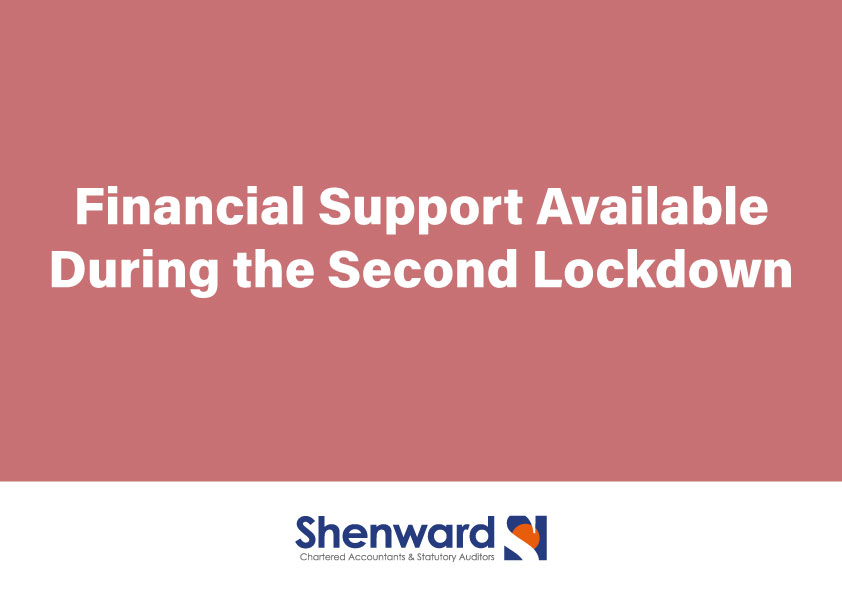Financial Support Available During the Second Lockdown
Last week, just days after the Chancellor Rishi Sunak announced amendments to the Job Support Scheme, we were notified as a nation that a second national lockdown would be enforced and therefore changes would be made to the proposed financial support packages.
Whilst this brings good news to many, the endless changes and amendments to the various schemes is causing widespread confusion. So where do we stand in terms of the financial support available as we head into lockdown?
Let’s explore!
Furlough scheme extended
In a shock turn of events, Chancellor Rishi Sunak announced that the Furlough Scheme would be extended until March 2021, despite originally announcing it would only be available until some point in December.
Whilst the majority of the criteria and rules remain the same as when it was first introduced, there are some significant elements which are worth noting.
- As before, the government will pay 80% of employees’ wages up to a cap of £2,500. This grant must be paid to the employee in full.
- Neither the employer nor employee needs previously to have used the JRS, however, to be eligible under this extension, employees must be on an employer’s PAYE payroll by 23:59 30th October 2020. This means a Real Time Information (RTI) submission notifying payment for that employee to HMRC must have been made on or before 30th October 2020. This is a significant change from the JRS in recent months, employees could only be furloughed if they had been prior to 30 June 2020.
- Employers should continue to pay the employee for hours worked in the normal way.
- Employers will only be required to cover National Insurance and employer pension contributions for employees on furlough.
- There’s no change to the level of the scheme available in August i.e. employers can claim a grant of 80% of hours not worked however they are required to settle employers’ national insurance contributions and pensions contributions.
- The Job Support Scheme (JSS) which was due to replace the furlough scheme has been postponed until the furlough scheme ends.
- Flexible furloughing will continue to be available, as well as full-time furloughing.
The government has announced they will soon be confirming when claims can first be made, but as far as we know, there will be no gap in support between 31 October when the scheme was originally due to end.
Financial help for the self-employed
The Self-Employed Income Support Grant is being extended from 40% to 80% for the period of the lockdown and up to March at the latest.
- The government is providing a total of £4.5 billion worth of grants between November and January.
- Maximum grants increase to £5,160.
- You must have qualified for the first and second grants earlier this year to be eligible for the new grant, which is the third round of grant funding for the self-employed. However, you do not need to have claimed these earlier grants to be eligible for this new grant.
- The grants are available to the self-employed and those in partnerships, but not for limited company directors.
- To qualify, you must declare an intention to continue trading.
- You will need to be experiencing reduced demand due to Covid-19 or have been previously trading but unable to do so now because of the pandemic.
- The grant claim will be based on your trading profits in the 2018/19 tax year, or average profits in 2018/19, 2017/18 and 2016/17.
Despite this extension, there are still thousands of self-employed who will be excluded from any form of financial support, raising cause for concern as the pandemic continues to disrupt their ability to earn.
New Style Jobseeker’s Allowance (JSA) and Universal Credit
The new style jobseeker’s allowance has been introduced for those who are unable to work due to the pandemic and do not qualify for other forms of support.
You could get this if:
- you usually work less than 16 hours a week
- you are under State Pension age
- you have made enough National Insurance contributions over the last 2 to 3 years
It’s worth noting that your savings and partner’s income will not affect how much you can claim.
Depending on your circumstances, you may also be able to claim Universal Credit at the same time as JSA. This can include additional amounts for things like rent or the costs of raising children.
The criteria for Universal Credit states:
- you must have less than £16,000 in savings
- you or your partner must be under State Pension age
As always, if you require support or have any questions in relation to the updated schemes, please get in touch with Sherad Dewedi via sherad@shenward.com.

